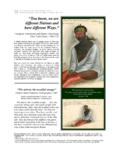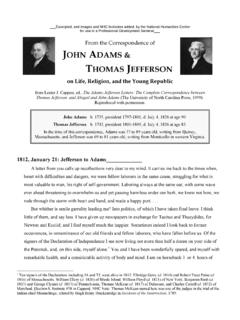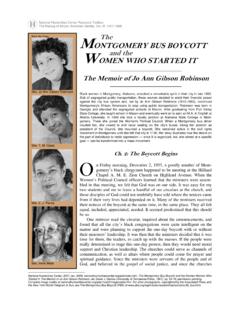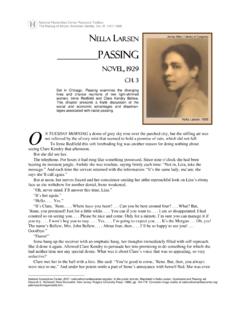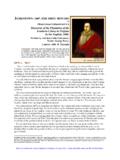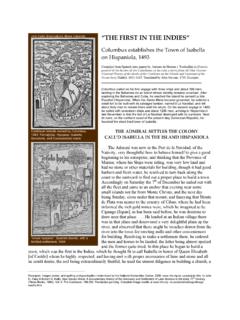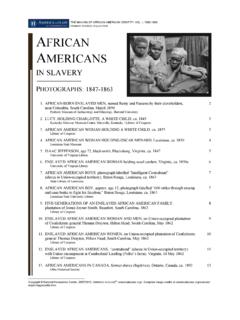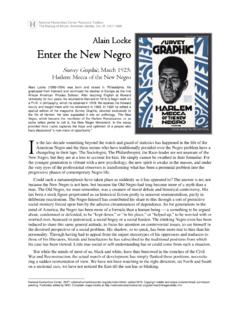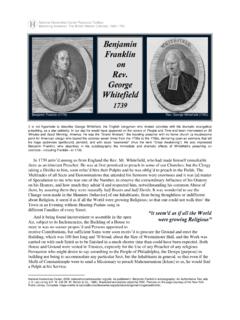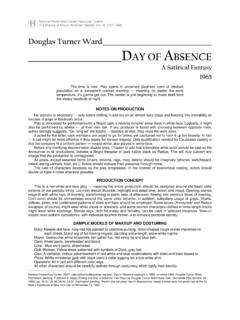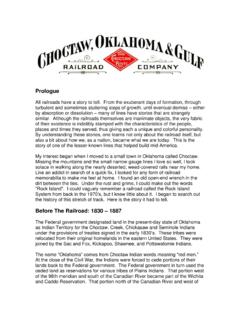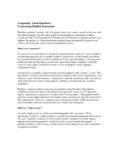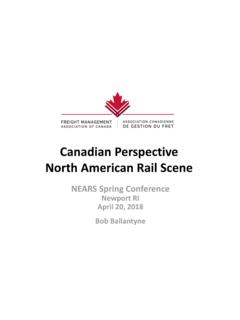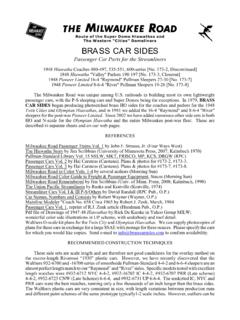Transcription of Frederick Jackson Turner, 'The Significance of the ...
1 Wisconsin Historical Society ___Frederick Jackson Turner___. The Significance of the Frontier in American History 1893. A paper read at the meeting of the American Historical Association in Chicago, 12 July 1893, during the World Columbian Exposition*. ____Excerpts____. Frederick Jackson Turner * *. I n a recent bulletin of the Superintendent of the Census for 1890 appear these significant words: Up to and including 1880 the country had a frontier of settlement, but at present the unsettled area has been so broken into by isolated bodies of settlement that there can hardly be said to be a frontier line. In the discussion of its extent, its westward movement, etc., it can not, therefore, any longer have a place in the census reports. This brief official statement marks the closing of a great historic movement.
2 Up to our own day American history has been in a large degree the history of the colonization of the Great West. The existence of an area of free land, its continuous recession, and the advance of American settlement westward, explain American development. Behind institutions, behind constitutional forms and modifications, lie the vital forces that call these organs into life and shape them to meet changing conditions. The peculiarity of American institutions is, the fact that they have been compelled to adapt themselves to the changes of an expanding people to the changes involved in crossing a continent, in winning a wilderness, and in developing at each area of this progress out of the primitive economic and political conditions of the frontier into the complexity of city life. Said Calhoun1 in 1817, We are great, and rapidly I was about to say fearfully growing!
3 So saying, he touched the distinguishing feature of American life. All peoples show development; the germ theory of politics has been sufficiently emphasized. In the case of most nations, however, the development has occurred in a limited area; and if the nation has expanded, it has met other growing peoples whom it has conquered. But in the case of the United States we have a different phenomenon. Limiting our attention to the Atlantic coast, we have the familiar phenomenon of the evolution of institutions in a limited area, such as the rise of representative government; the differentiation of simple colonial governments into complex organs; the progress from primitive industrial society, without division of labor, up to manufacturing civilization. But we *. Excerpted, and images and numbered footnotes added, by the National Humanities Center, Research Triangle Park, NC.
4 2005. Turner's footnoted comments, and his citations of direct quotations, are included here, not his many content citations. For the full text and footnotes, see The Frontier in American History, 1920, ch. 1, from the American Studies Program, University of Virginia, at ~HYPER/TURNER/. *. A paper read at the meeting of the American Historical Association in Chicago, July 12, 1893. It first appeared in the Proceedings of the State Historical Society of Wisconsin, December 14, 1893, with the following note: "The foundation of this paper is my article entitled 'Problems in American History,' which appeared in The gis, a publication of the students of the University of Wisconsin, November 4, 1892.. [Ellipsis in original] It is gratifying to find that Professor Woodrow Wilson whose volume on 'Division and Reunion' in the Epochs of American History Series, has an appreciative estimate of the importance of the West as a factor in American history--accepts some of the views set forth in the papers above mentioned, and enhances their value by his lucid and suggestive treatment of them in his article in The Forum December, 1893, reviewing Goldwin Smith's 'History of the United States.
5 '" The present text is that of the Report of the American Historical Association for 1893, 199-227.. [Footnote in address as reprinted in Turner, The Frontier in American History, 1920]. 1. In 1817 John C. Calhoun represented South Carolina in the House. Later in the year he was appointed Secretary of War by President James Monroe. [NHC note].. Abridgment of Debates of Congress, v, p. 706. [Footnote in Turner, Frontier, 1920]. have in addition to this a recurrence of the process of evolution in each western area reached in the process of expansion. Thus American development has exhibited not merely advance along a single line, but a return to primitive conditions on a continually advancing frontier line, and a new development for that area. American social development has Library of Congress been continually beginning over again on the frontier.
6 This perennial rebirth, this fluidity of American life, this expansion westward with its new opportunities, its continuous touch with the simplicity of primitive society, furnish the forces dominating American character. The true point of view in the history of this nation is not the Atlantic coast, it is the Great West. Even the slavery struggle, which is made so exclusive an object of attention by writers like Professor von Holst,2. occupies its important place in Map showing the position of the center of population at the close of each American history because of its decade from 1790 to 1890, in Gannett, Statistical Atlas of the United States, based upon the results of the eleventh census, 1898. relation to westward expansion. In this advance, the frontier is the outer edge of the wave the meeting point between savagery and civilization.
7 Much has been written about the frontier from the point of view of border warfare and the chase, but as a field for the serious study of the economist and the historian it has been neglected. The American frontier is sharply distinguished from the European frontier a fortified boundary line running through dense populations. The most significant thing about the American frontier is, that it lies at the hither edge of free land. In the census reports it is treated as the margin of that settlement which has a density of two or more to the square mile. The term is an elastic one, and for our purposes does not need sharp definition. We shall consider the whole frontier belt, including the Indian country and the outer margin of the settled area of the census reports. This paper will make no attempt to treat the subject exhaustively; its aim is simply to call attention to the frontier as a fertile field for investigation, and to suggest some of the problems which arise in connection with it.
8 In the settlement of America we have to observe how European life entered the continent, and how America modified and developed that life and reacted on Europe. Our early history is the study of European germs developing in an American environment. Too exclusive attention has been paid by institutional students to the Germanic origins, too little to the American factors. The frontier is the line of most rapid and effective Americanization. The wilderness masters the colonist. It finds him a European in dress, industries, tools, modes of travel, and thought. It takes him from the railroad car and puts him in the birch canoe. It strips off the garments of civilization and arrays him in the hunting shirt and the moccasin. It puts him in the log cabin of the Cherokee and Iroquois and runs an Indian palisade around him.
9 Before long he has gone to planting Indian corn and plowing with a sharp stick, he shouts the war cry and takes the scalp in orthodox Indian fashion. In short, at the frontier the environment is at first too strong for the man. He must accept the conditions which it furnishes, or perish, and so he fits himself into the Indian clearings and follows the Indian trails. Little by little he transforms the 2. Hermann von Holst, German historian, author of Constitutional and Political History of the United States, 1873-91. [NHC note]. 2. wilderness, but the outcome is not the old Europe, not simply the development of Germanic germs, any more than the first phenomenon was a case of reversion to the Germanic mark. The fact is, that here is a new product that is American. At first, the frontier was the Atlantic coast.
10 It was the frontier of Europe in a very real sense. Moving westward, the frontier became more and more American. As successive terminal moraines result from successive glaciations,3 so each frontier leaves its traces behind it, and when it becomes a settled area the region still partakes of the frontier characteristics. Thus the advance of the frontier has meant a steady movement away from the influence of Europe, a steady growth of independence on American lines. And to study this advance, the men who grew up under these conditions, and the political, economic, and social results of it, is to study the really American part of our history.. The rising steam navigation on western waters, the opening of the Erie Canal, and the westward extension of cotton culture added five frontier states to the Union in this period.
